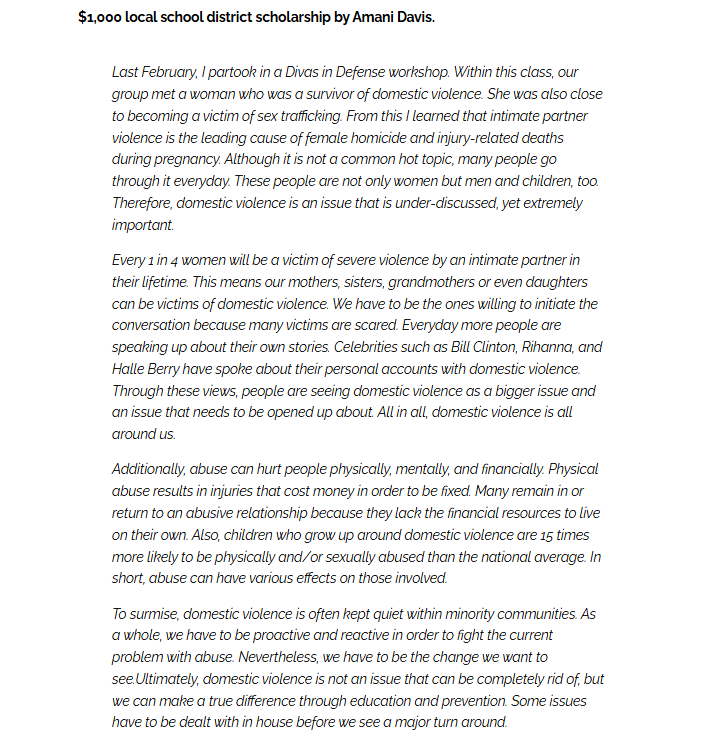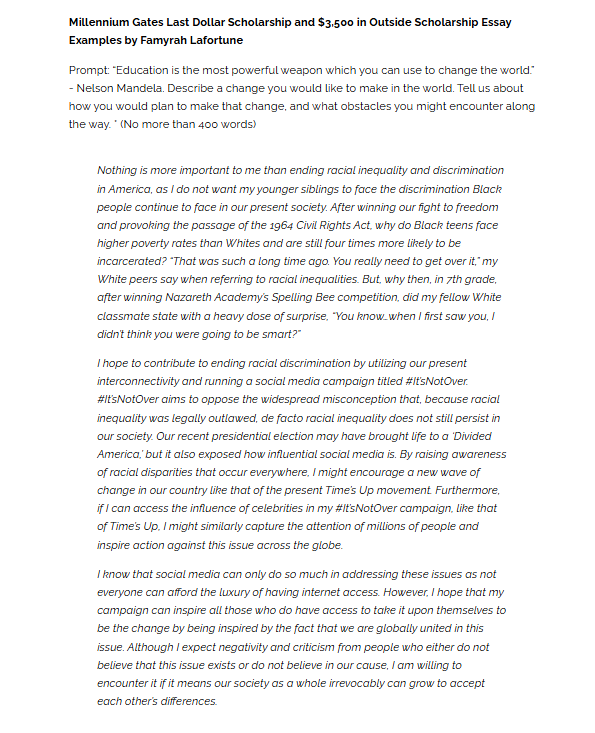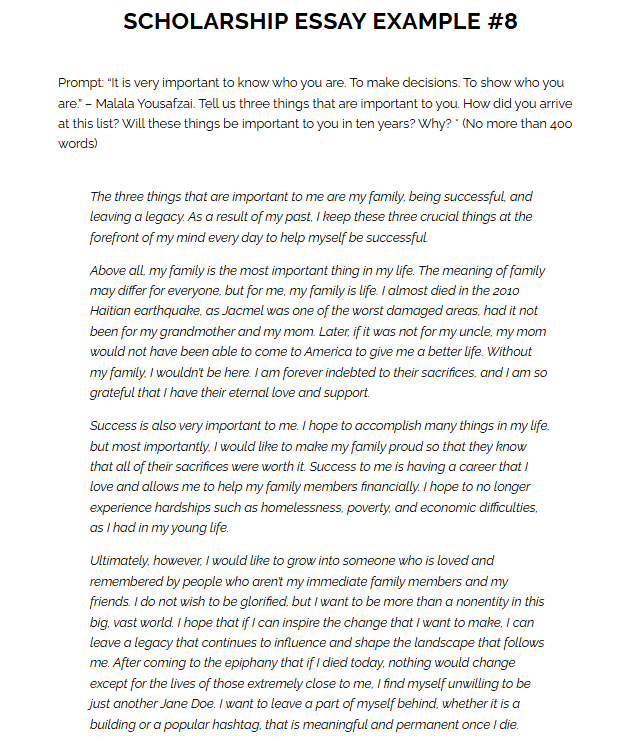Are you struggling to find out how to write a winning scholarship essay? You're not alone. Many students find it challenging to stand out amongst other applicants, particularly with the pressure to tell a compelling story within a few hundred words.
Truth be told, a generic or poorly written essay can cost you a life-changing opportunity, irrespective of how strong your achievements or grades are. And without the right strategy, you can easily fall into common traps like vague writing, missed prompts, or bland storytelling.
That's why we put together this scholarship essay writing guide packed with proven scholarship essay tips, advice on how to write a scholarship essay, and winning scholarship essay examples to inspire your own. Read this article to learn how to turn your story into a standout application that gets noticed.
What You Should Know About The Scholarship Committee’s Expectations

Before you consider applying for a scholarship, you need to understand one thing: writing a winning scholarship essay is beyond impressing with big words or sounding like someone you’re not.
You must understand what the scholarship committee wants and present it in your most authentic voice. So, what is the committee looking for? Let's break it down.
1. They Want to Know Who You Are
Beyond your achievements, scholarship committees want to know you. What motivates you? Who are you beyond the grades and extracurriculars?
What challenges have you overcome? Essentially, your essay should feel like a conversation where you’re giving them a peek into your life, values, and aspirations. This is a crucial aspect of how to write a scholarship essay that resonates.
2. Alignment with The Scholarship's Purpose
Every scholarship aims to achieve a purpose. It could be to support future leaders in STEM, assist students with financial aid, facilitate community service, or support specific social or cultural causes.
Whichever the goal, ensure your essay aligns with it. However, you don't have to twist your story to fit in; instead, highlight the aspects of your journey that match their values. Understanding the scholarship's purpose is one of the key scholarship essay tips you shouldn't ignore.
3. Write an Authentic, Compelling Story
Scholarship committees read hundreds of essays, so you don't have to blend in. Stand out with your original story.
Whether it’s how you taught yourself programming from YouTube videos or turned a failed science project into a business idea, your story reveals your true character, potential, and growth. The winning scholarship essay examples in this guide showcase authentic storytelling—keep reading to see them.
4. Strong Writing
No, you don't have to write like Shakespeare. But they want to be convinced that you can clearly express yourself and organize your thoughts without grammar mistakes. So, write like you're conversing with someone—avoid big vocabulary and prioritize clarity.
After writing, edit and proofread your essay. Knowing how to write a scholarship essay that's error-free indicates your attention to detail.
5. Talk About Your Passion, Purpose, and Plans
“What will you do with this opportunity?” or “Why do you deserve this?” are some common questions that scholarship committees often ask to know if their support or money will make a positive difference in your life.
And by extension, they want to see if it will positively impact the lives of others. So, talk about your drive, goals, and how the scholarship will help you achieve them. This will make them see the potential return on their investment.
Scholarship Essay Tips: Key Components of a Winning Scholarship Essay

Want to know what makes scholarship essays stand out? These core elements can help yours outshine other applicants.
-
Start with a strong opening hook. Begin with a compelling, intriguing, or insightful opening. This captivates the reader’s attention while encouraging them to keep reading. Avoid starting your essay with a cliche, dictionary definition, or quote—keep things original right off the bat. This is one of the most important scholarship essay tips.
-
Maintain a clear structure. An organized essay is easy to understand. So, follow the standard structure: introduction, body, and conclusion. This format gives your essay a logical flow and keeps the reader engaged. You’ll learn how to write a scholarship essay in the latter part of this guide.
-
Be original and write in your voice. Scholarship committees prioritize genuine stories over polished ones. Highlight your true self and be honest when sharing your experiences. Remember, authenticity resonates better than perfection. The winning scholarship essay examples in this guide highlight the writer's unique voice.
-
Align your essay with the scholarship’s mission. Tailor your essay to reflect how your aspirations match their mission. For example, if the scholarship prompt emphasizes community service, highlight your volunteer experiences and commitment to making an impact.
- Show, don't just tell. Rather than sharing dry facts, demonstrate them with stories. For instance, instead of saying, “I’m a dedicated student,” describe a time when you overcame hurdles to achieve academic success. This is a better approach to showcase your determination and character.
Read this article: NNPC/TotalEnergies Scholarship 2025: Everything Nigerian Students Need to Know
Scholarship Essay Tips: How to Write a Winning Scholarship Essay

Crafting a strong essay doesn’t have to be overwhelming. Here’s a step-by-step guide to help you write with purpose and impact.
Start Early
Although scholarship deadlines vary throughout the year, most local ones tend to fall between January and April of your senior year. Regardless of the deadline, begin writing those essays early. Procrastinating often leads to rushed, poor writing.
So, give yourself enough time to research, write, proofread, and receive professional feedback. Your final draft should illustrate how your goals align with the scholarship's values and mission, and that kind of clarity takes time.
Also, you can save yourself a ton of time by pre-writing and reusing your essays. Just ensure you carefully tweak each one to match the specific scholarship or school you're applying to.
Hook Your Reader with a Strong Opening
Scholarship committees usually go through hundreds of applications. The essays that make it to the top? They grab attention right from the first sentence. A solid hook that sparks curiosity can make all the difference in your essay.
One great approach for writing a strong opening: start with a vivid anecdote or personal story that pulls the reader in. This kind of opening not only captures readers into your world but also encourages them to keep reading.
Tell Your Story
Scholarship committees want to understand how your personal achievements connect to your future goals and how the scholarship can help you get there. You don’t have to bare your soul or share your deepest secrets.
However, the strongest essays often include real moments or details that help committees feel a connection to the student. Clear, direct writing that stirs emotion works well for prompts asking about personal experiences.
Additionally, authenticity is a big deal to the scholarship committee. Instead of trying to guess what the committee wants to hear, focus on what makes you a standout candidate for the award. However, be mindful of your tone. You don’t want to come off as boastful, but you should sound confident and own your story.
Answer Scholarship Essay Prompts Directly and Thoroughly
Scholarship essays typically come with a word limit—usually around 500 words—so you have limited time to convey your message. While some prompts are broad, most are very specific. That’s why it’s important to read each prompt carefully and make sure you’re actually answering what’s being asked.
Focus on one or two strong examples that clearly answer the question and efficiently tell your story. To structure your response effectively, use the AEC formula: make your Assertion, back it up with Evidence, and add Commentary.
Once you’re done writing, have someone proofread your essay without showing them the prompt. If they can still tell what question you were answering, you’ve nailed it.
Use Strong and Polished Writing
When texting your friends, casual grammar and slang are fine. But when writing scholarship essays, keep that writing style far away. Using shorthand, slang, or incorrect grammar and punctuation can instantly hurt your credibility.
It also signals that you didn’t put much effort into your essay. Successful essays don’t happen in one draft—they’re the result of careful writing, revising, editing, and proofreading. Take the time to polish your work so it reflects your best writing.
Check out: Miva Open University: A Comprehensive Guide to Nigeria’s First Fully Online University
Dos and Don'ts of Scholarship Essay Writing

Writing a great scholarship essay takes more than just good grammar. Keep these dos and don’ts in mind to avoid common mistakes and boost your chances.
Dos of Scholarship Essay Writing
-
Remain positive. Avoid cynicism because it won't impress the admissions or scholarship committee.
-
Provide depth and concentrate on one specific idea or event. Personal anecdotes work best.
-
Use analogies (like similes and metaphors) to drive your points, but don't overuse them.
-
Answer the question that is being asked.
-
Be concise. Get to the point without rambling.
-
Be honest. Don't pretend to be someone you're not. Discuss the real qualities you have.
-
Include dialogue in your essay, but avoid using a screenplay approach unless you want to major in theater arts.
-
Vary sentence length. Use more short sentences but mix them up with long ones for natural rhythm.
-
Avoid grammatical errors. Proofread carefully or ask someone else to review it. Reading aloud also helps catch mistakes.
-
Use good closure. Give your essay a strong sense of closure or bring it full circle.
See also: Chevening Scholarship Nigeria: A Complete Guide for Aspiring Scholars
Don'ts of Scholarship Essay Writing
-
Don't include others’ quotes in your essay. While it's good to know what others say, scholarship and college admission committees want to read your thoughts, not Martin Luther King Jr. or Benjamin Franklin's thoughts.
-
Avoid discussing controversial or sensitive topics like:
-
Drugs, alcohol, sex, or other moral issues
-
Romantic relationships
-
Politics or religion
-
Views on current issues like disarmament, abortion, etc.)
3. Share opinions, but don’t sound like a critical newspaper editorial or stand on a moral soapbox.
4. Avoid sounding overly idealistic.
5. Don’t use your essay to explain weaknesses. Low grades, low SAT scores, or lack of extracurriculars aren’t worthy of being discussed in your essay.
6. Don’t begin every sentence with “I.” Vary your sentence structure.
7. Avoid phrases like “finally,” “in sum,” or “in conclusion.”
8. Don’t repeat your points or summarize.
9. Avoid dumb alliterations. It can sound forced and silly.
10. Don’t say you’re a unique or interesting person; show it through your essay.
Also read: Commonwealth Shared Scholarship: A Gateway to Fully Funded Study in the UK
Winning Scholarship Essay Examples

The following scholarship essay examples will inspire you to write yours.
1. $1,000 Local School District Scholarship by Amani Davis
 Scholarship essay culled from collegeessayguy.com
Scholarship essay culled from collegeessayguy.com
2. Millennium Gates Last Dollar Scholarship and $3,500 in Outside Scholarship Essay by Famyrah Lafortune
 Scholarship essay culled from collegeessayguy.com
Scholarship essay culled from collegeessayguy.com
3. Millennium Gates Last Dollar Scholarship
 Scholarship essay culled from collegeessayguy.com
Scholarship essay culled from collegeessayguy.com
FAQs
1. How do I title an essay for a scholarship?
A good title should be intriguing, relevant to your essay's subject matter, and in some ways represent your writing style or personality.
If your essay focuses on a particular experience or event, you may choose a title that captures that, like “Finding My Path: Overcoming Obstacles in Science.”
2. How to write a 250-word scholarship essay?
You’ll need to write a concise 250-word essay. Your first sentence should grab the reader's attention, and each word should contribute to answering the prompt.
Support your points with succinct examples, and end with a thought-provoking final sentence.
3. How to end a scholarship essay?
A solid scholarship essay conclusion should restate the thesis, summarize the key points, and highlight how the scholarship will help you achieve your long-term objectives.
This creates a lasting impression on the reader. Rather than simply restating the essay, it should be a brief, impactful paragraph. Many winning scholarship essay examples feature strong conclusions.
Conclusion
Writing a winning scholarship essay takes time, strategy, and a personal touch. But it’s absolutely doable.
By starting early, staying original, and following the proven scholarship essay writing tips in this guide, you’ll be in a strong position to craft an essay that stands out and secures that scholarship.

You must be logged in to post a comment.